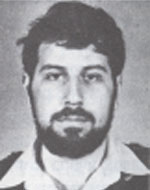Baruch, son of Tzila and Ze’ev, was born on April 16, 1951. He completed his elementary studies at the Dror School in Kiryat Eliezer and continued to study for two years in the vocational high school in Kiryat Sprinzak, After graduating he joined the IAF Technical School, where he continued professional studies until he enlisted in the Air Force, and during his youth Baruch was involved in sports, winning many prizes – especially in the various running sectors. To participate in the journey of reconstructing the path of the liberators of Safed. He was also a member of a sailboat learning class. Most of his talents were in the humanities, although later in his career he chose the real field. He loved history very much, and his excellent memory helped him, he liked to read books, and he wrote compositions and figurines. When he was a student at school, one time he did not prepare his lessons, and when the teacher told him to read the essay, which had to be written in the house, he stood up and held an empty piece of paper and read it fluently. He was awarded a grade of 10. From childhood, Baruch was a sociable man with a slightly cynical sense of humor and a favorite of all his acquaintances. He liked to travel, play football and spend time at dancing parties. As a trainee in the technical school, he received a certificate of excellence in his department. Baruch was drafted into the Israel Defense Forces in late March 1969 and was assigned to the Israel Air Force, where he completed an electrical-systems course, And remained until the day of his death, during which he offered a number of important efficiency suggestions to the corps, including the development of a system designed to make it easier for students to study in the classroom, thus saving many hours of study. And good soldiers in the future for the Air Force, and twice he received the “Outstanding Guide” certificate He liked to build and create things himself, with diligent work in the laboratory, and he added to it more and more tools and accessories that were designed to help him and his students perform their work. In all the tests at the base, he was awarded grades 80 to 90. His commanders, who appointed him as head of the stage, wanted to nurture him for future promotion, and he was one of the few who was entitled to wear a gold profession. A great devotion to the role, responsible, reliable, with a very good reception, is among the best (if not the most successful ). In 1970, Baruch decided to take the matriculation exams, which he had not yet completed, so that he could continue his studies. Although he dealt in a clearly technical-real-life profession, and had outstanding talents, Baruch had a strong tendency toward humanism. In one of the pamphlets of the unit, a list of his writings was published: “On Friday, as I wander between the square and the multi-story buildings, and the sun stands near the middle of the sky, everything is suddenly lost, and there is no doubt that we are alone, … and I go down to the square in front of the building, and who walks around in a hurry, if not a few guys, who decided to stay on Shabbat and inhance our duty, and they beat the Torah as a ball that bounces on the surface, “In 1972, Baruch married his girlfriend, Nili, and the young couple built their home in Kiryat Motzkin, near Haifa. He decided to be an educator, and to abandon the electronics, and so he asked L.Received for officers’ course. His request was approved, and shortly before the war broke out he joined the course. When the Yom Kippur War broke out, he returned to his mother unit as an aircraft systems electrician. On October 12, 1973, he was hit by a helicopter crash and fell. He was brought to eternal rest in the Haifa cemetery. He left behind a wife, father and mother. After his fall, he was promoted to lieutenant colonel. In a letter of condolence to the bereaved family, his commander wrote: “His work as a guide and his qualities as a human being put him in the first line of our studies. “He said. A list was written in his memory in the unit newsletter
